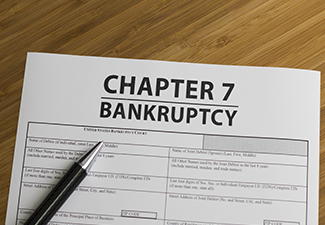Dispelling Bankruptcy Myths
Oct. 29, 2021
Thousands of Nevada residents file for bankruptcy each year, seeking relief for both personal financial struggles as well as financial hardship associated with a business. In 2019, nearly 8,000 Nevada residents filed for bankruptcy. The number dipped to just below 7,000 in 2020, likely because the COVID-19 pandemic was surging, limiting access to the court system.
While bankruptcy often has a negative connotation, the process should not be seen as scary or as a recognition of financial failure. Seemingly profitable businesses take advantage of U.S. bankruptcy laws every day. Seeking the aid of the bankruptcy court may be necessary depending on unique financial circumstances.
Scott N. Tisevich, Attorney at Law is a bankruptcy attorney who dedicates his practice to helping clients find the best option for achieving debt relief. Serving Reno, Churchill County, Lyon County, Carson City, Story County, Douglas County, and Las Vegas, Nevada, the Law Office of Scott N. Tisevich can reach clients throughout the state.
The following myths about bankruptcy make it difficult for those who are financially distressed to seek the help they need. Hopefully, by dispelling these myths, Nevada residents in need of financial help will consider bankruptcy as a viable option for debt elimination.
Myth No. 1 – Bankruptcy Permanently Ruins Your Credit
A common myth shared by many people is that bankruptcy permanently tarnishes a person's credit. While filing for bankruptcy may lower a person's credit score, going through the bankruptcy process may actually help that credit score rise more quickly than it otherwise would without bankruptcy. Through the bankruptcy process, creditors cannot report negative information to the credit bureaus for missed payments. A halt on creditor harassment stops the bleeding and alleviates some stress.
Myth No. 2 – Bankruptcy Discharges All Debt
Some people believe that through bankruptcy, all debt can be discharged. While most debt can be discharged, certain debts cannot. Such debts include, but may not be limited to, past-due child support payments, spousal support, or alimony payments, unpaid student loans, and unpaid taxes.
Myth No. 3 – You Lose Your House and Other Assets
Filing for bankruptcy does not mean a person will lose a home or other assets. Depending on a person's situation, liquidating all assets may be the best option for eliminating debt. In such cases, a person may choose to file for Chapter 7 bankruptcy. So long as a person is up to date on mortgage payments, he or she can keep his or her home during the Chapter 7 bankruptcy process.
Individuals who choose to file for Chapter 13 bankruptcy, which is a repayment plan program, can keep most of their assets so long as they are up to date on payments. Chapter 13 bankruptcy is a type of debt consolidation that allows individuals to pay one monthly payment that is distributed amongst all creditors.
Myth No. 4 – Filing for Bankruptcy Means Financial Failure
Bankruptcy laws exist for a reason. Even the hardest working individuals may be overcome by debt, especially in the time of COVID-19, which has wreaked havoc on many people physically, mentally, and financially. Filing for bankruptcy means a decision has been made to eliminate debt and that bankruptcy is the best option over all other available options. Filing for bankruptcy is a recognition that debts must be paid to start off with a clean slate.
Myth No. 5 – Debt Consolidation Is a Better Option
Many debt consolidation agencies and credit counseling programs allow consumers to combine all their credit card payments into one lower monthly payment. Debt consolidation and debt settlement are not the same things, and consumers often get confused. With debt settlement, agencies will seek to negotiate with creditors to reduce the total balance owed. However, with debt settlement, monthly payments are halted, and creditors will continue to report missed payments, causing substantial harm to one's credit score that may be far worse than the damage bankruptcy causes.
Some debt consolidation agencies do help individuals break free from credit card debt, but they do not help with other forms of debt such as personal loans and secured debts. Also, some debt consolidation programs allow individuals to keep credit cards open, which can defeat the purpose of a debt consolidation program. Overall, while bankruptcy can have a negative impact on credit, it still may have a better long-term outcome than any type of debt consolidation program.
To receive thorough and honest advice, the best course of action is to consult with a Reno, Nevada bankruptcy attorney.
Experienced Bankruptcy Attorney Serving Reno, Nevada
If you are considering bankruptcy as one option for eliminating your debt, it may be time to speak with a Reno, Nevada Chapter 7 bankruptcy attorney. Bankruptcy is not for everyone, so it is important to discuss all debt elimination options with a legal professional. Scott N. Tisevich, Attorney at Law, provides legal representation and guidance to clients throughout Reno, Nevada, as well as Churchill County, Lyon County, Carson City, Douglas County, and Las Vegas. Contact the Law Office of Scott N. Tisevich today for a free case evaluation.
